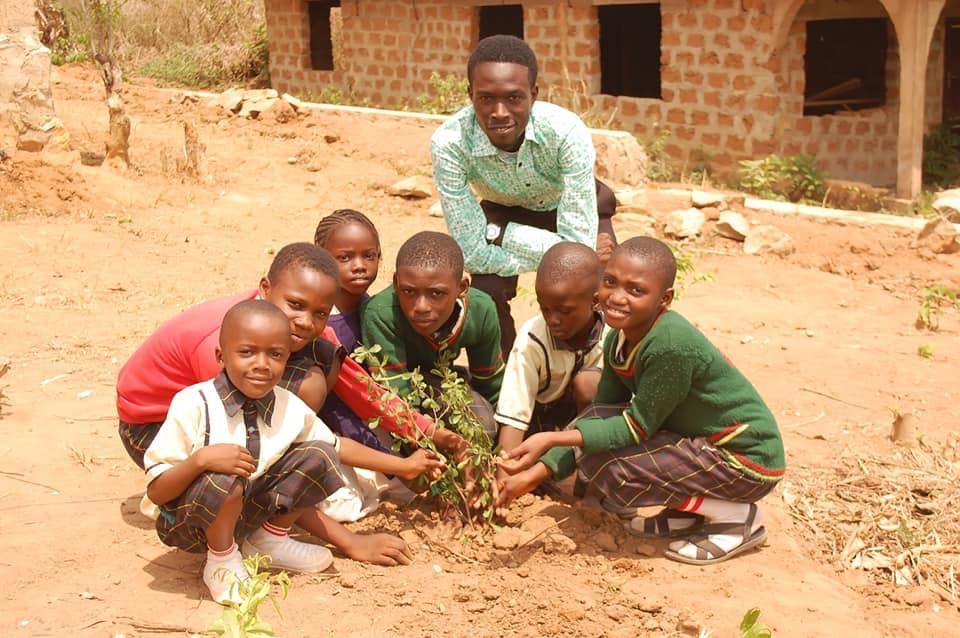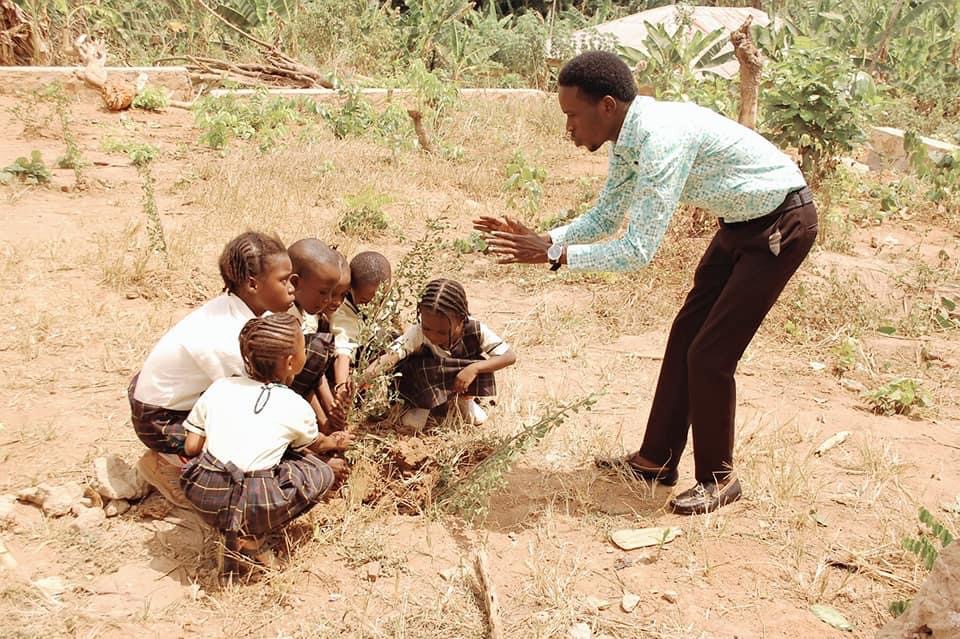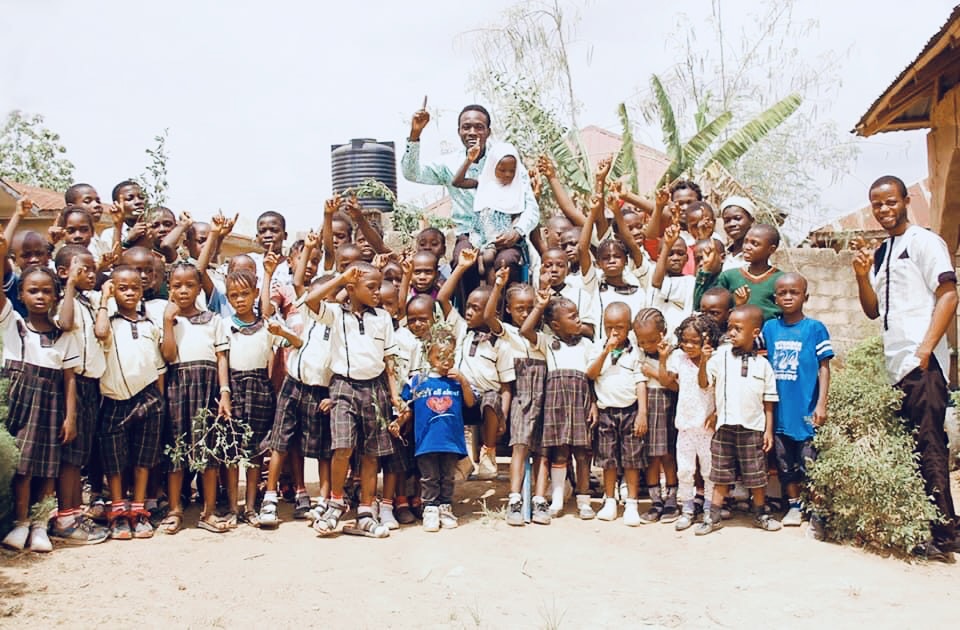
Wole Adegbule

Wole Adegbule
Going to school as a child used to be fun. Aside from the expected interesting knowledge imparted by the school teachers, there were other aspects attached to the daily school routine which were once so amusing. Among these were the abundant free foods on the streets that led to my school. There used to be different kinds of fruit-bearing trees pounced on by the students, especially when returning home.
My father’s neighbor, Mr. Ige took it to another level — he specially created a garden with Indigenous fruits and vegetables such as Spondias mombin (iyeye), African Star Apple (Agbalumo), Irvingia gabonensis (oro) in his yard. Despite struggling financially himself, he had done so much to reduce hunger in the town to a bare minimum.
However, strolling around the same streets today, one can hardly find a single tree planted as they have been uprooted for the construction of more buildings for businesses and supposedly developmental projects. Today, deforestation is one of the major drivers of climate change, and in my hometown in Nigeria, it contributes to ravaging food scarcity as well.
According to the UN World Food Programme, over 25 million Nigerians face acute hunger. This calls for urgent concern as it aligns with the predictions of other global bodies, which further elucidate the effects of climate change on food security in Nigeria.
More so, the 2022 Global Hunger Index affirms that Nigeria ranks 103rd out of the 121 countries with sufficient data to calculate 2022 GHI scores. With a score of 27.3, Nigeria has a level of hunger that is serious. This suggests that 12.9 percent of the global population in extreme poverty was found in Nigeria as of 2022.
Yusuf Hameed, a farmer in Southwestern Nigeria, lamented on the increasing rate of deforestation in his community, claiming that the songs of birds fade each day.
“Deforestation has been a concern over the years. On a daily basis, I notice a diminution of the level of the songs made by the birds, as there are very few trees around,” Hameed said.
The disappearance of local birds is more than just a bad omen. With fewer trees surrounding his farm, Hameed attributes a growing number of poultry deaths to the lack of shade. “This has affected my poultry farm considering the intense amount of unbearable heat that penetrates into the poultry during the day, leading to fatality of the birds,” he said.

This issue is coupled with the growing problem of climate change, which is a significant factor in Nigeria’s decreasing agricultural productivity, according to the FAO.
“Climate change poses a significant impact on farm produce, primarily through changes in temperature, precipitation patterns, and extreme weather events. Higher temperatures mean quicker rate of spoilage and deterioration of perishable produce after harvest,” said Babajide Oluwase, CEO of EcoTutu, a cleantech company that strives to make cooling more affordable and accessible for businesses, especially in the agriculture sector.
“[Increased heat] leads to post-harvest losses, affecting the quantity and quality of farm produce available to feed the teeming population,” he said.
Farmers on the ground-level are also employing solutions to drier conditions. Stella Arowolo, who also goes by Àgbébìnrin, is a farmer and young leader in Abeokuta, a city in Southwestern part of Nigeria who uses a method known as soilless farming.
“So in respect to my kind of farming, which is soilless farming, the whole system mitigates climate change because it is a refined, profitable and sustainable way to produce food in order to end hunger, achieve food security, improve nutrition and ensure sustainable food systems,” said Arowolo.
Soilless farming makes use of a hydroponics system that can save water, space, and nutrients. Plants such as rice and maize have been tested on soilless farming and they yielded good produce. However, a major challenge of soilless farming in Nigeria is the inadequate infrastructure and lack of resources needed to supply the nutrients necessary for strong yields.
Another challenge associated with soilless farming is the cost. According to Àgbébìnrin, “In the process of laying hands on alternative means [of] food production, [technologies and innovations] are being explored which are actually expensive compared to the conventional ways of farming.”
Farmers need to be empowered with financial assistance and/or fruits-bearing trees for them to plant and monitor till they grow to maturity. This support could be implemented by the government through the involvement of policy makers.
In addition, formulation and implementation of policies for effective environmental governance and climate action which protect forest resources and enforce massive afforestation projects are highly needed.
This also educates people on food security and regulates the incessant depletion of trees, animals and farmlands. More so, environmental education should be taught in the school curriculum to erase environmental illiteracy starting from the grassroots.

Despite the challenges, I can still see hope in forest restoration. Community engagement and education are key, which is why I am engaging my community on sustainable interventions such as “Igiwuló Campaign.” Igiwuló is a Yoruba word that means, “Trees are important.” It is a green educational strategy designed to engage people on tree planting in schools and communities.
Igiwuló merges teaching and afforestation together through programs that involve young people in their schools and their parents in their communities, it teaches the effects of deforestation, citing examples such as flooding, erosion, high temperature and food security, and proposes solutions to these challenges.
Through these efforts, I hope to restore my childhood memories of trees and fruits covering the city streets and make vital nutrition available to the neighborhood kids once again.